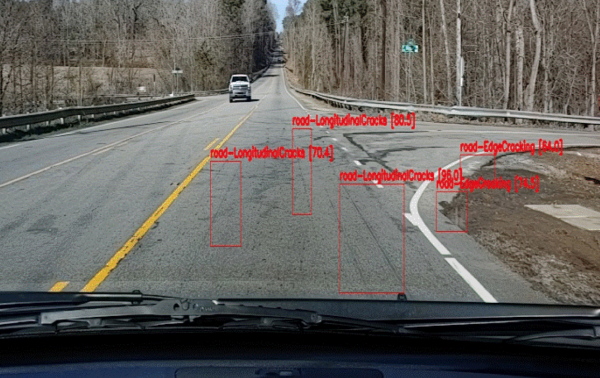Artificial Intelligence System Monitors Road Conditions with Triple Bottom Line Benefits
August 25, 2020
Robocist is a Raleigh-based startup founded in 2015. They are a team of 12 members who have developed an artificial intelligence software system that captures data on the conditions of roads. Their innovative software is able to capture road condition data such as cracks and potholes, and automatically catalogs, assesses, and geotags any such conditions with over 90% accuracy. Once the data is collected, an intelligence algorithm processes the data and it is uploaded to a cloud-based location for clients to access.
Before the creation of such software, a Department of Transportation (DOT) would have to send over 200 drivers out either every year or every three years to manually collect road data. The group would drive along a relatively small portion of the roads, and stop and get out of the car to assess road conditions. This posed a serious danger to the road condition assessors, who risked being hit by oncoming traffic. This process would cost a DOT over 4 million dollars annually.
However, with the introduction of Robocist’s software, this process is no longer necessary. The software, once installed in public vehicles, constantly captures data, eliminating the need for dedicated vehicles and drivers to go out and capture the data manually. Additionally, Robocist’s software is able to collect data monthly, compared to previous methods which only gathered data annually or tri-annually. Further than that, Robocist is able to provide their data at half the cost of the previous method.
The image below shows an example of the capabilities of the Robocist software. This artificial intelligence system highlights and labels any issues found on the roads in the red boxes in the image.
The development of this software opens the doors for municipalities to more accurately monitor their road conditions, and determine where road improvements are needed. It is much less expensive than current methods of doing so, and much safer as well. One consumer of the technology, the North Carolina Department of Transportation, has estimated that their use of the Robocist technology could save them 1.5 million dollars annually, and 19 million dollars over 10 years. Also, as the data is collected via artificial intelligence, the data is much more consistent than human recorded data. Robocist’s software will allow DOTs to improve their operational efficiency with this increased consistency, ease of accessing a plethora of data, and reduction in the amount of resources required to conduct road surveys.
Robocist uses a triple bottom line in their business. In terms of social benefits, Robocist provides safety benefits to road assessors, and allows DOTs to have a more equitable view of road conditions that is not limited to the certain main roads that would normally have been surveyed. Environmentally, the improved road conditions that will come from this improvement in data collection will decrease congestion on roads, and improve fuel economy for cars. These improvements will result in vehicles using less fuel, and thus emitting less greenhouse gasses. From an economic standpoint, the benefits are clear with massive reductions in savings for DOTs as mentioned earlier. The DOTs are not the only ones who stand to gain from improved road conditions. Poor road conditions cost drivers billions of dollars every year due to accidents and tire wear. Delivery businesses also stand to gain from more efficient roads, as reductions in driving time would save them huge amounts of money. These numerous benefits from Robocist’s innovative software have made huge strides in the world of efficient data collection and clean technology for smart cities.
About the Author
Written by Kerina Patel
Class of 2021, B.S. Statistics and Analytics,
B.A. Environmental Studies, Sustainability Concentration,
Minor in City and Regional Planning
